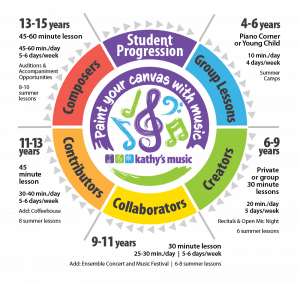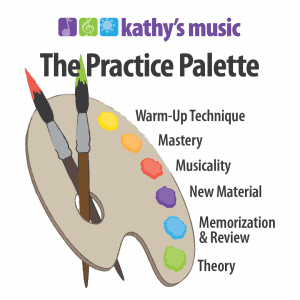by Kathy Morrison, Director.
Parents we know that the #1 challenge when it comes to taking music lessons is finding time and using time well for effective practice.
Here are 3 rules to keep in mind when planning practice time with your student. Yes, I said it. PLAN your practice ahead of time for the whole week. If you are lucky enough to be in a position where your student can practice the same time every day of the week for at least 5 days, then you have it made! BUT usually that’s not the case. So PLAN IT IN.
Rule #1: Repetition over time is more important than a long time on one day.
In order to follow this rule, you do have to plan ahead. Decide on 5 days each week that your student can practice. The length of time varies based on their level of study:
Creators (6-9 yrs) in private 30 minute lessons or group lessons– 20 minutes day, 5 days a week
Collaborators (9-11 yrs) in private 30 minute lessons – 25-30 minutes a day, 5-6 days a week
Contributors (11-13 yrs) in private 45 minute lessons – 30-40 minutes a day, 5-6 days a week
Composers (13-15 yrs) in private 45-60 minute lessons – 45-60 minutes a day, 5-6 days a week
Adult Students (16+ yrs) in private lessons – 45-60 minutes a day, 5 days a week
Rule #2: Practice with a goal in mind, no matter how small.
Use our Practice Planner to set a goal for each day of practice. What will I work on today?
After your warm up, choose 1 thing to focus on, such as learning the first line of a new song or learning a new scale. Break down the goal into small pieces like measures and learn one measure at a time. Use our Practice Palette for ideas on how to focus on different things.
When you learn the 1st measure, then work on the 2nd measure. Then stop and put measures 1 and 2 together. Repeat them a few times. Add the next measure and so on. This kind of process will eat up your practice time, but the student is playing, he’s LEARNING. She’s building muscle memory.
Each day continue to review from previous days. Now your practice has something to show for the time invested. The next day it will be more motivating to sit down and work again. That’s the goal. Find the motivation so the student will just do it, rather than having to be told.
Rule #3: When kids stop wanting to practice, it’s time to change it up. All of it.
When students resist practicing, that’s often a signal that it’s time to change it up.
If they usually practice after school, consider doing it BEFORE school – yep at 7:00 AM. Imagine how fresh they would be if they could do music practice first thing instead of after school when they are tired and hungry.
Change the room or the corner of the room they are practicing in. Research shows this makes a difference. So just change it up.
Change the routine. If the student practices in a particular order or routine, then work the routine backwards OR create a card game to decide what he/she will practice next. In fact, turn the WHOLE practice experience into a game. If they love baseball, then practice like he’s the lead-off batter for the home team. If they love a particular TV show, then choose each part of the practice to represent a character in the show. Choose a card for the character and then practice accordingly. You get the idea. Be creative and include your student in making up the game.
Reminder: Playing is NOT practicing.
This is the #1 PITFALL encountered by new lesson students. Most of the time, students think that if they play their instrument it counts as practice. Set the record straight. Playing is playing – and it’s fun. Do it and enjoy it. Write your own music and dream of being a star. BUT please keep in mind that ONLY practice counts as practice. Everything else is just playing.



Leave a Reply